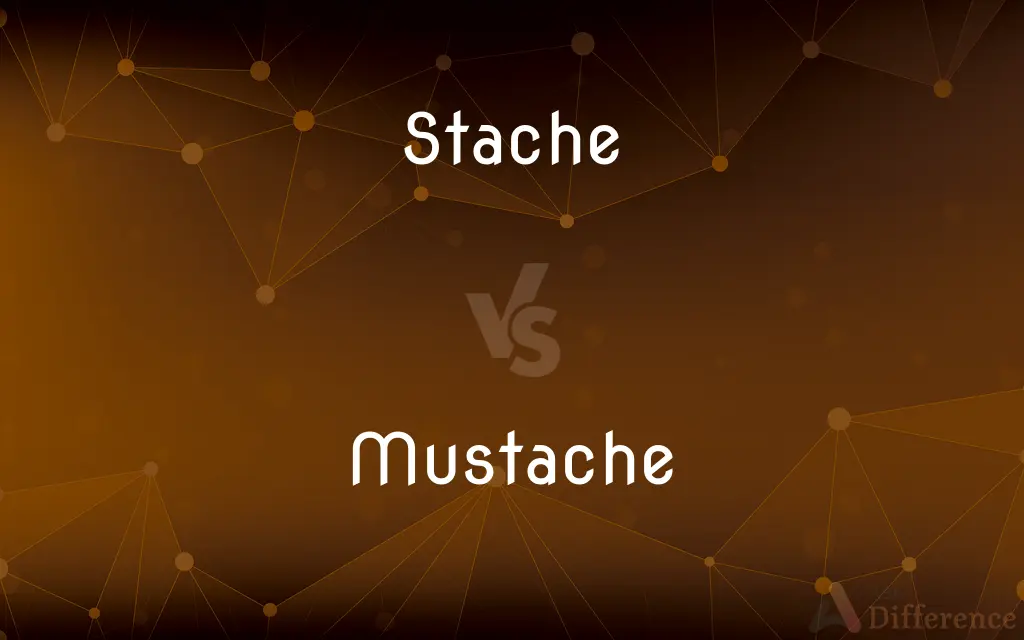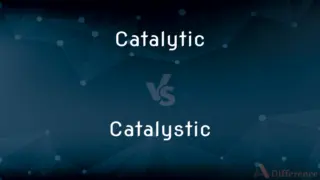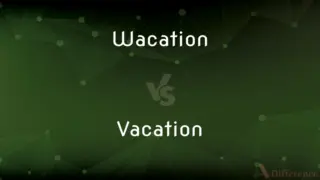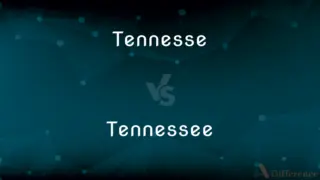Stache vs. Mustache — Which is Correct Spelling?
Edited by Rabia Sajjad — By Urooj Arif — Updated on April 23, 2024
"Stache" is the incorrect spelling of "mustache," which refers to facial hair grown on the upper lip.

Table of Contents
Which is correct: Stache or Mustache
How to spell Mustache?

Stache
Incorrect Spelling

Mustache
Correct Spelling
ADVERTISEMENT
Key Differences
Recall that "mustache" shares a structure with words like "mustard" and "muster," which also start with "must."
Associate "mustache" with "moustache," which is the British English spelling, both containing the "must" prefix.
Remember that "mustache" includes "must," hinting that one must have it to be called such.
How Do You Spell Mustache Correctly?
Incorrect: He dyed his stache black for the play.
Correct: He dyed his mustache black for the play.
Incorrect: He decided to shave off his stache for the wedding.
Correct: He decided to shave off his mustache for the wedding.
ADVERTISEMENT
Incorrect: I think I'll grow a stache this November for charity.
Correct: I think I'll grow a mustache this November for charity.
Incorrect: That actor is known for his iconic stache.
Correct: That actor is known for his iconic mustache.
Incorrect: Her grandfather had a famous stache that everyone admired.
Correct: Her grandfather had a famous mustache that everyone admired.
Mustache Definitions
Symbolic of maturity and wisdom in many cultures.
In many societies, a mustache is considered a sign of becoming a man.
A style of facial hair specific to the upper lip, often groomed in various shapes.
He styled his mustache into a fine handlebar shape.
Hair grown and left unshaved on the upper lip.
His mustache was thick and well-groomed.
Used to describe something that resembles or relates to a mustache.
The dog had a marking on its face that looked like a mustache.
Part of various iconic looks and characters in media and literature.
The character's thick mustache became his trademark feature.
The hair growing on the human upper lip, especially when cultivated and groomed.
A group of bristles or hairs about the mouth of an animal.
Distinctive coloring or feathers near the beak of a bird.
Food or drink sticking conspicuously to the upper lip
Wiped the milk mustache from my face.
(US) moustache.
That part of the beard which grows on the upper lip; hair left growing above the mouth.
A West African monkey (Cercopithecus cephus). It has yellow whiskers, and a triangular blue mark on the nose.
Any conspicuous stripe of color on the side of the head, beneath the eye of a bird.
A stain or discoloration on the upper lip of a person; as, wearing a milk mustache.
An unshaved growth of hair on the upper lip;
He looked younger after he shaved off his mustache
Mustache Meaning in a Sentence
The barber offered to trim his mustache.
Actors often grow a mustache for period roles.
Many famous figures have sported a mustache.
He used wax to style his mustache.
Young men often try to grow a mustache as a rite of passage.
He combed his mustache carefully every morning.
His mustache added to his distinguished look.
She painted a mustache on her face for the costume party.
There are clubs and societies dedicated to mustache grooming.
His grandfather always had a full, white mustache.
Some competitive swimmers shave their mustache before big races.
The detective in the novel is described as having a bushy mustache.
Growing a mustache is a popular No-Shave November activity.
His mustache was a topic of conversation at the party.
The disguise included a fake mustache.
They held a contest to judge the best mustache.
The mustache was slightly uneven on one side.
Judges in old photographs often sport a mustache.
He felt that his mustache gave him a distinguished air.
She complimented him on how his mustache suited his face.
The mustache became more popular in the 1980s.
The mustache helped him look older and more authoritative.
His mustache took weeks to grow to the desired thickness.
He shaved off his mustache on a whim.
In the film, the villain twirled his mustache.
Mustache Idioms & Phrases
A mustache-twirling villain
A stereotypical evil character in stories, often seen as overly dramatic.
The play featured a classic mustache-twirling villain.
Wear the mustache
To exhibit masculinity or authority.
He really wore the mustache in the household, making all the major decisions.
With a fine-tooth mustache comb
Paying attention to meticulous details.
The contract was reviewed with a fine-tooth mustache comb.
Under one's mustache
Speaking quietly or mumbling.
He muttered the secret plans under his mustache.
To mustache something away
To hide or keep something secret.
He mustached away the old love letters in a drawer.
A mustache of authority
A reference to someone's authoritative presence, often symbolized by their mustache.
The professor's mustache of authority made students take him very seriously.
Mustache ride
A playful and somewhat risqué phrase referring to sitting on one's upper lip.
The phrase mustache ride is often seen on humorous t-shirts.
Mustache moment
A moment of male bonding or camaraderie.
They shared a mustache moment when they both realized they loved the same football team.
As plain as the mustache on one's face
Very obvious or evident.
His displeasure was as plain as the mustache on his face.
Thicker than a mustache
Describes something dense or complex.
The plot of the novel was thicker than a mustache.
Behind the mustache
Hidden aspects of one's personality.
His gentle nature was the kindness behind the mustache.
Grow a mustache
To mature or take on responsibilities.
It's time for him to grow a mustache and take care of his finances.
Under the mustache
Concealed or hidden, often referring to emotions or thoughts.
He kept his feelings under the mustache, rarely showing his true emotions.
Mustache you a question
A playful pun used when asking a question.
I mustache you a question, but I'll shave it for later.
Mustache-meeting
A discussion or gathering among men, typically involving talk of male interests or concerns.
The club's annual mustache-meeting was scheduled for June.
Twist one's mustache
To plot something sinister or mischievous.
He twisted his mustache as he devised the prank.
Trimming the mustache
Making minor adjustments or changes.
Let's start trimming the mustache on this project to make deadlines.
Mustache of the matter
The core or most important part of an issue.
Let's get to the mustache of the matter and discuss the main issue here.
Mustache of silence
A period of silence or a pause in conversation, often reflective.
There was a mustache of silence before he answered.
Pulling one's mustache
Expressing doubt or skepticism.
He pulled his mustache, unsure about the proposal.
Common Curiosities
What is a stressed syllable in mustache?
The stressed syllable in mustache is the first syllable: mus-tache.
How do we divide mustache into syllables?
Mustache is divided into syllables as mus-tache.
What is the pronunciation of mustache?
Mustache is pronounced as /ˈmʌs.tæʃ/.
How is mustache used in a sentence?
Mustache is used as a noun to describe the facial hair grown above the upper lip, e.g., He trimmed his mustache every morning to keep it neat.
How many syllables are in mustache?
There are two syllables in mustache.
What is the verb form of mustache?
Mustache does not have a verb form as it is a noun.
Why is it called mustache?
It is called mustache, derived from the French word "moustache," which itself originates from the Italian "moustacio," likely influenced by the Greek word "mustax" meaning upper lip or facial hair.
What is the root word of mustache?
The root word of mustache comes from the Italian "moustacio," derived from the Greek "mustax."
What is another term for mustache?
Another term for mustache could be "whiskers."
What is the plural form of mustache?
The plural form of mustache is mustaches.
Is mustache a noun or adjective?
Mustache is a noun.
Is the word “mustache” a Direct object or an Indirect object?
The word “mustache” can be a direct object, as in “He trimmed his mustache.”
What part of speech is mustache?
Mustache is a noun.
Is mustache an adverb?
No, mustache is not an adverb; it is a noun.
Is the word mustache imperative?
No, mustache is not an imperative; it is a noun.
Is the word mustache Gerund?
No, mustache is not a gerund; it is a noun.
Which conjunction is used with mustache?
Conjunctions like "and," "but," or "or" can be used with mustache.
Which article is used with mustache?
The indefinite article "a" is typically used with mustache.
What is the opposite of mustache?
There isn't a direct opposite of mustache in terms of facial hair; however, being clean-shaven would be the opposite condition.
Is mustache a vowel or consonant?
Mustache is a word composed of both vowels and consonants.
Which vowel is used before mustache?
The article "a" is used before mustache, as it starts with a consonant sound.
What is the singular form of mustache?
The singular form of mustache is mustache.
Is mustache an abstract noun?
No, mustache is a concrete noun as it refers to physical facial hair.
Is mustache a negative or positive word?
Mustache is a neutral word; it is neither inherently negative nor positive.
Is mustache a countable noun?
Yes, mustache is a countable noun.
Is mustache a collective noun?
No, mustache is not a collective noun; it refers to individual facial hair.
Is the mustache term a metaphor?
Mustache can be used metaphorically in phrases to imply notions of maturity, masculinity, or the style of a certain period.
Which determiner is used with mustache?
Determiners such as "a," "the," or possessive forms like "his" or "her" can be used with mustache.
Which preposition is used with mustache?
Prepositions such as "on" (on his face) or "with" (with a mustache) are used with mustache, depending on the context.
Share Your Discovery

Previous Comparison
Catalytic vs. Catalystic
Next Comparison
Travell vs. TravelAuthor Spotlight
Written by
Urooj ArifUrooj is a skilled content writer at Ask Difference, known for her exceptional ability to simplify complex topics into engaging and informative content. With a passion for research and a flair for clear, concise writing, she consistently delivers articles that resonate with our diverse audience.
Edited by
Rabia Sajjad











































